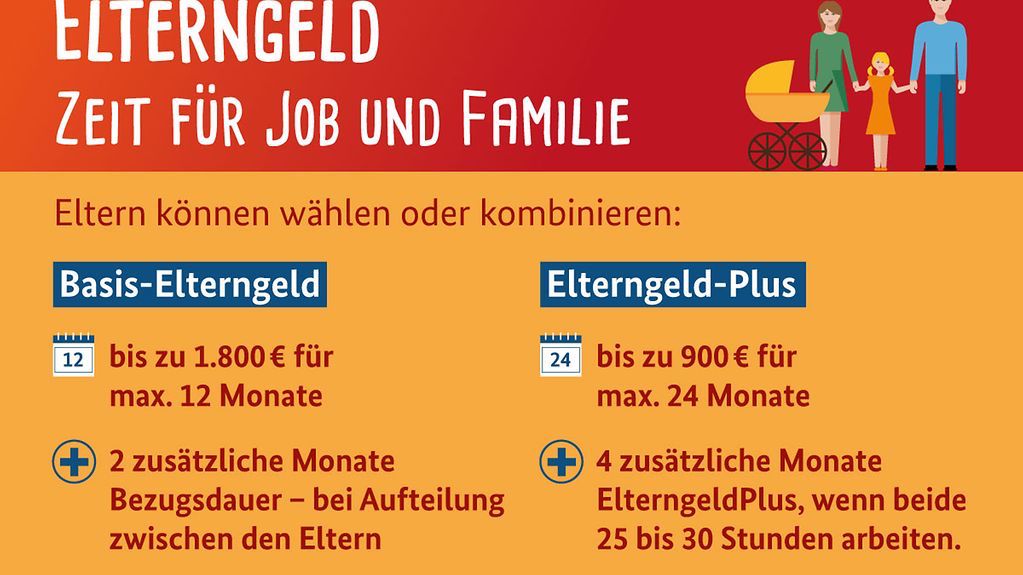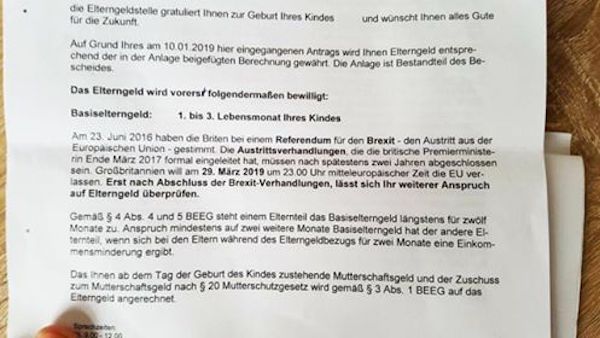Donald Tusk had a seminal moment Wednesday when he uttered the phrase so many British expats across Europe have been thinking: “I’ve been wondering what that special place in Hell looks like for those who promoted Brexit without even the sketch of a plan how to carry it out safely.”
Tusk promptly caught hell from Brexiteers. But here’s what he meant. (Keeping with Tusk’s riff, we can say the devil is indeed in the details.)
Dispatches contributor Laura Kaye is a British expat living in Berlin. She just confirmed that, though Germany is giving British expats a grace period to apply for long term visas as third-country nationals, it seems that certain entitlements will be immediately suspended if there is a no-deal Brexit on 29 March.

Goodbye new-parent allowance?
For example, at about 49 days out from Brexit, several of her fellow expats received notification from German officials that their applications for Elterngeld (“parent money”) have been denied, at least for the time being. Elterngeld is money provided to help cover any loss of income during parental leave. New parents can claim 67 percent of their net income for a period of up to 14 months.
It is available to expats living in Germany providing they have European Union citizenship or a residence permit that allows them to work. And, of course, following a no-deal Brexit, British nationals without dual nationality will have neither of these, at least in the short term.
 This is an extract from a letter recently received by a British parent living in Berlin, citing Brexit uncertainty as the reason for postponing a decision on her application for Elterngeld:
This is an extract from a letter recently received by a British parent living in Berlin, citing Brexit uncertainty as the reason for postponing a decision on her application for Elterngeld:
On 23 June 2016, the British voted via referendum for Brexit – to exit the European Union. The exit negotiations formally initiated by the British Prime Minister at the end of March 2017 must be completed within two years at the latest. Great Britain wants to leave the EU on 29 March 2019 at 23.00 Central European Time. Only after completion of the Brexit negotiations, can your further claim for parental allowance be checked.
“This is a really big deal!” Laura said. “Parents have been working and paying taxes throughout pregnancy, on the assumption that they’ll be able to take paid leave once their baby arrives. And then, all of a sudden, that all goes away without any time to formulate a Plan B.
“This isn’t a token amount of money. This is what families rely on to pay their rent. It looks like payments could be backdated once people have been granted work permits, but that doesn’t help pay the bills in the meantime. Money worries are the last thing people need when they’ve recently had a baby!”
It is unclear whether this situation is particular to just one Elterngeldstelle (parental benefit issuing office), or whether this is Berlin or Germany-wide. It is also unclear whether this will only be the case for new applicants, or whether parents already receiving Elterngeld will be affected.
Expats in limbo
Either way, these new developments leave many new parents in limbo for the time being. Laura cites a conversation with one new mother who explained more about her situation. Having applied for Elterngeld following the birth of her son, German authorities told her they will not currently approve any payments beyond February 2019. (Yes, that’s this month!)
Hi Laura, Yes the financial uncertainty is very frustrating!! We’ve lived here for 3 years, and paid taxes etc – but Elterngeld is only available to
either EU citizens, or people with a work permit. The letter basically states that because my status after March is unclear – they cannot confirm or send any payments. Once the Brexit deal is clear, I will need to get the relevant paperwork (work permit etc.) and then my Elterngeld will be backdated.
The woman also explained how this has given her further cause for concern about the other ways Brexit might impact her status here in German: “I was so shocked when I got the letter!!…it made me start to wonder about my employment status and everything else! What a mess.”
This is a concern that Laura also shares. As Dispatches recently reported, British citizens residing in Germany are being asked to register with the relevant authorities to help make plans for a possible no-deal Brexit. On registering, they have been given a document that temporarily allows them to stay living and working in Germany, but does not guarantee their current rights as EU citizens, or even reentry to the country.
“It’s obviously a relief to know that we’ll be able to stay, at least until we can apply for a residence permit,” Laura said. “But it’s clear now that we won’t have the same rights as we currently do. People are even wondering whether it’s safe to book travel outside of Germany in April, in case they have trouble getting back in. And, of course, lots of people are worrying about whether they’ll actually qualify for a residency permit.”
Now, this issue with the Elterngeld has her wondering what other entitlements people might lose: “Child allowance, unemployment benefits, childcare and Kindergarten vouchers? This is really worrying.”
Brexit, not Germany, to blame
Sensing the possibility of backlash from Brexiteers who may put the blame here with the German authorities, she was quick to explain that she doesn’t blame Germany for the mess that she and her fellow expats find themselves in.
“I don’t see this as malicious,” she said. “If there’s a no-deal Brexit there won’t be any official transition period, so we won’t legally qualify for these benefits. Literally overnight.”
“Promising not to kick people out is one thing” she argues, “but it puts Germany in a difficult situation when they have to decide whether, and how, to issue benefits to people who aren’t legally entitled to them. So it makes sense that there’ll be uncertainty. But, of course, that also isn’t any comfort to someone who might be about to have their income suddenly cut off.
“No, Germany aren’t the ones to blame here!”
Co-CEO of Dispatches Europe. A former military reporter, I'm a serial expat who has lived in France, Turkey, Germany and the Netherlands.















